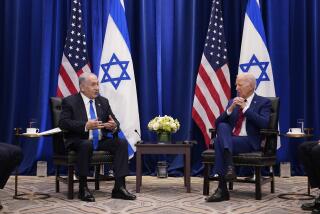Clinton ‘Intrudes’ for Peace in Peres, Arafat Meetings : It’s no surprise that the U.S. prefers Labor over Likud
- Share via
Invitations to confer with the president of the United States in the Oval Office are coveted by most world figures as tangible evidence of their international stature. This week, in a meeting that both host and guest at one time would have considered scarcely imaginable, it was Yasser Arafat’s turn to be greeted by President Clinton. The invitation for their first one-on-one meeting at the White House was bluntly a political reward for Arafat’s achievement in getting the Palestine National Council to scrap the clauses in its covenant that deny Israel’s right to exist and call for its destruction. Removing that obstacle assures that negotiations between Israel and the Palestinians can move ahead, a key goal of U.S. foreign policy.
The 45-minute-long Clinton-Arafat talk followed by a few days Clinton’s two meetings with Israeli Prime Minister Shimon Peres, encounters notable for their outpouring of mutual praise and admiration. Peres, facing a tough national election on May 29, has not been reticent about directing attention to his high standing in Washington. “Relations between the United States and Israel have reached a new peak,” he said on his return home. All this has produced understandable mutterings from Peres’ political foes. Benjamin Netanyahu, leader of the Likud opposition, accuses Peres of “a cynical attempt” to exploit his relations with the United States for partisan advantage. Others complain that Clinton, by embracing Peres, is intruding into Israel’s domestic affairs.
Truth to tell, he is, and he’s not doing much to hide it. Certainly it’s no secret to Israelis that the United States would be much more comfortable dealing with a Labor-led government than with one headed by Likud. That has little to do with personalities or Israeli domestic affairs and everything to do with foreign policy. Shepherding the Middle East peace process is a top administration priority, and the changes that it has encouraged in a situation that once seemed intractable are among its major achievements. Labor is pledged to pursue the peace process vigorously. Likud, representing both Bible-based territorial claims on the West Bank and profoundly held national security concerns, has no such commitment.
Will Clinton’s barely disguised preference influence Israel’s famously independent-minded voters? Probably not. In the end, Israelis, like the electorate in every democracy, can be expected to cast their ballots based on their deepest hopes and fears. The president’s warm and admiring words for Peres seem likely to sway few votes.
More to Read
Get the L.A. Times Politics newsletter
Deeply reported insights into legislation, politics and policy from Sacramento, Washington and beyond. In your inbox twice per week.
You may occasionally receive promotional content from the Los Angeles Times.










